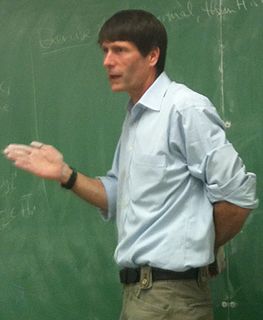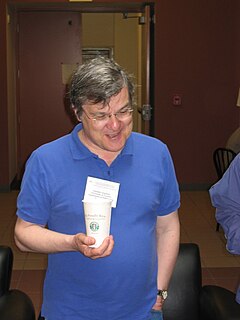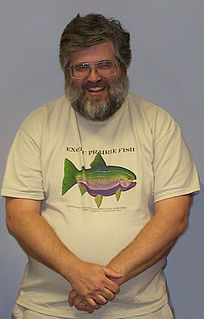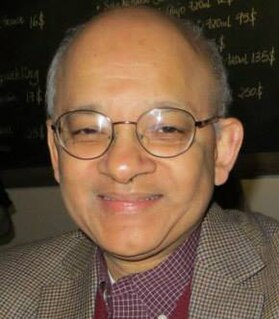
Steven J. Brams is an American game theorist and political scientist at the New York University Department of Politics. Brams is best known for using the techniques of game theory, public choice theory, and social choice theory to analyze voting systems and fair division. He is one of the independent discoverers of approval voting, as well as extensions of approval voting to multiple-winner elections to give proportional representation of different interests.

Robert Sedgewick is an American computer scientist. He is the founding chair and the William O. Baker Professor in Computer Science at Princeton University and was a member of the board of directors of Adobe Systems (1990–2016). He previously served on the faculty at Brown University and has held visiting research positions at Xerox PARC, Institute for Defense Analyses, and INRIA. His research expertise is in algorithm science, data structures, and analytic combinatorics. He is also active in developing the college curriculum in computer science and in harnessing technology to make that curriculum available to anyone seeking the opportunity to learn from it.

John Edward Hopcroft is an American theoretical computer scientist. His textbooks on theory of computation and data structures are regarded as standards in their fields. He is the IBM Professor of Engineering and Applied Mathematics in Computer Science at Cornell University, Co-Director of the Center on Frontiers of Computing Studies at Peking University, and the Director of the John Hopcroft Center for Computer Science at Shanghai Jiao Tong University.

Halil Mete Soner is a Turkish American mathematician born in Ankara. Soner's current research interests are nonlinear partial differential equations; asymptotic analysis of Ginzburg-Landau type systems, viscosity solutions, and mathematical finance.

The Courant Institute of Mathematical Sciences is the mathematics research school of New York University (NYU), and is among the most prestigious mathematics schools and mathematical sciences research centers in the world. Founded in 1935, it is named after Richard Courant, one of the founders of the Courant Institute and also a mathematics professor at New York University from 1936 to 1972, and serves as a center for research and advanced training in computer science and mathematics. It is located on Gould Plaza next to the Stern School of Business and the economics department of the College of Arts and Science.

Thomas Callister Hales is an American mathematician working in the areas of representation theory, discrete geometry, and formal verification. In representation theory he is known for his work on the Langlands program and the proof of the fundamental lemma over the group Sp(4). In discrete geometry, he settled the Kepler conjecture on the density of sphere packings and the honeycomb conjecture. In 2014, he announced the completion of the Flyspeck Project, which formally verified the correctness of his proof of the Kepler conjecture.

Alasdair Ian Fenton Urquhart is a Scottish–Canadian philosopher and emeritus professor of philosophy at the University of Toronto. He has made contributions to the field of logic, especially non-classical logic. One of his ideas is proving the undecidability of the relevance logic R. He also published papers in theoretical computer science venues, mostly on mathematical logic topics of relevance to computer science.

Eduardo Daniel Sontag is an American mathematician, and distinguished university professor at Northeastern University, who works in the fields control theory, dynamical systems, systems molecular biology, cancer and immunology, theoretical computer science, neural networks, and computational biology.

Pramod P. Khargonekar is the Vice Chancellor for Research and Distinguished Professor of Electrical Engineering and Computer Science at the University of California, Irvine. An expert in control systems engineering, Dr. Khargonekar has served in a variety of administrative roles in academia and federal funding agencies. Most recently, he served as Assistant Director for Engineering at the National Science Foundation (2013-2016), and as Deputy Director for Technology at the Advanced Research Projects Agency – Energy. From 2001 through 2009 he was the Dean of the College of Engineering at the University of Florida.

Charles W. Misner is an American physicist and one of the authors of Gravitation. His specialties include general relativity and cosmology. His work has also provided early foundations for studies of quantum gravity and numerical relativity.

Edmund Melson Clarke, Jr. was an American computer scientist and academic noted for developing model checking, a method for formally verifying hardware and software designs. He was the FORE Systems Professor of Computer Science at Carnegie Mellon University. Clarke, along with E. Allen Emerson and Joseph Sifakis, received the 2007 ACM Turing Award.

Manuela Maria Veloso is the Head of J.P. Morgan AI Research & Herbert A. Simon University Professor in the School of Computer Science at Carnegie Mellon University, where she was previously Head of the Machine Learning Department. She served as president of Association for the Advancement of Artificial Intelligence (AAAI) until 2014, and the co-founder and a Past President of the RoboCup Federation. She is a fellow of AAAI, Institute of Electrical and Electronics Engineers (IEEE), American Association for the Advancement of Science (AAAS), and Association for Computing Machinery (ACM). She is an international expert in artificial intelligence and robotics.
Peter A. Wegner was a computer scientist who made significant contributions to both the theory of object-oriented programming during the 1980s and to the relevance of the Church–Turing thesis for empirical aspects of computer science during the 1990s and present. In 2016, Wegner wrote a brief autobiography for Conduit, the annual Brown University Computer Science department magazine.

Christopher Granger Atkeson is an American roboticist and a professor at the Robotics Institute and Human-Computer Interaction Institute at Carnegie Mellon University (CMU). Atkeson is known for his work in humanoid robots, soft robotics, and machine learning, most notably on locally weighted learning.
Stephen R. Hilbert is an American mathematician best known as co-author of the Bramble–Hilbert lemma, which he published with James H. Bramble in 1970. Hilbert's area of specialty is numerical analysis. He has been a professor of mathematics at Ithaca College since 1968. Additionally, he taught mathematics at Cornell University as a visiting program professor during the 2003–2004 academic year.

Sergei Nikolaevich Artemov is a Russian-American researcher in logic and its applications. He currently holds the title of Distinguished Professor at the Graduate Center of the City University of New York where he is the founder and head of its research laboratory for logic and computation. His research interests include proof theory and logic in computer science, optimal control and hybrid systems, automated deduction and verification, epistemology, and epistemic game theory. He is best known for his invention of logics of proofs and justifications.
Ioan Dzițac was a Romanian professor of mathematics and computer science. He obtained his B.S. and M.Sc. in Mathematics (1977) and PhD in Computer Science (2002) from Babeș-Bolyai University of Cluj-Napoca. He was a professor at the Aurel Vlaicu University of Arad and part of the leadership of Agora University in Oradea until his sudden death in 2021.
Sanjeev Ramesh Kulkarni is an Indian-born American academic. He is Professor of Electrical Engineering and Dean of the Faculty at Princeton University, where he teaches and conducts research in a broad range of areas including statistical inference, pattern recognition, machine learning, information theory, and signal/image processing. He is also affiliated with the Department of Operations Research and Financial Engineering and the Department of Philosophy. His work in philosophy is joint with Gilbert Harman. Kulkarni served as Associate Dean for Princeton University School of Engineering and Applied Science from 2003–2005, Master of Butler College from 2004-2012, Director of the Keller Center for Innovation in Engineering Education from 2011-2014, and Dean of the Graduate School at Princeton University from 2014-2017.

Prakash Panangaden is an American/Canadian computer scientist noted for his research in programming language theory, concurrency theory, Markov processes and duality theory. Earlier he worked on quantum field theory in curved space-time and radiation from black holes. He is the founding Chair of the ACM Special Interest Group on Logic and Computation.














